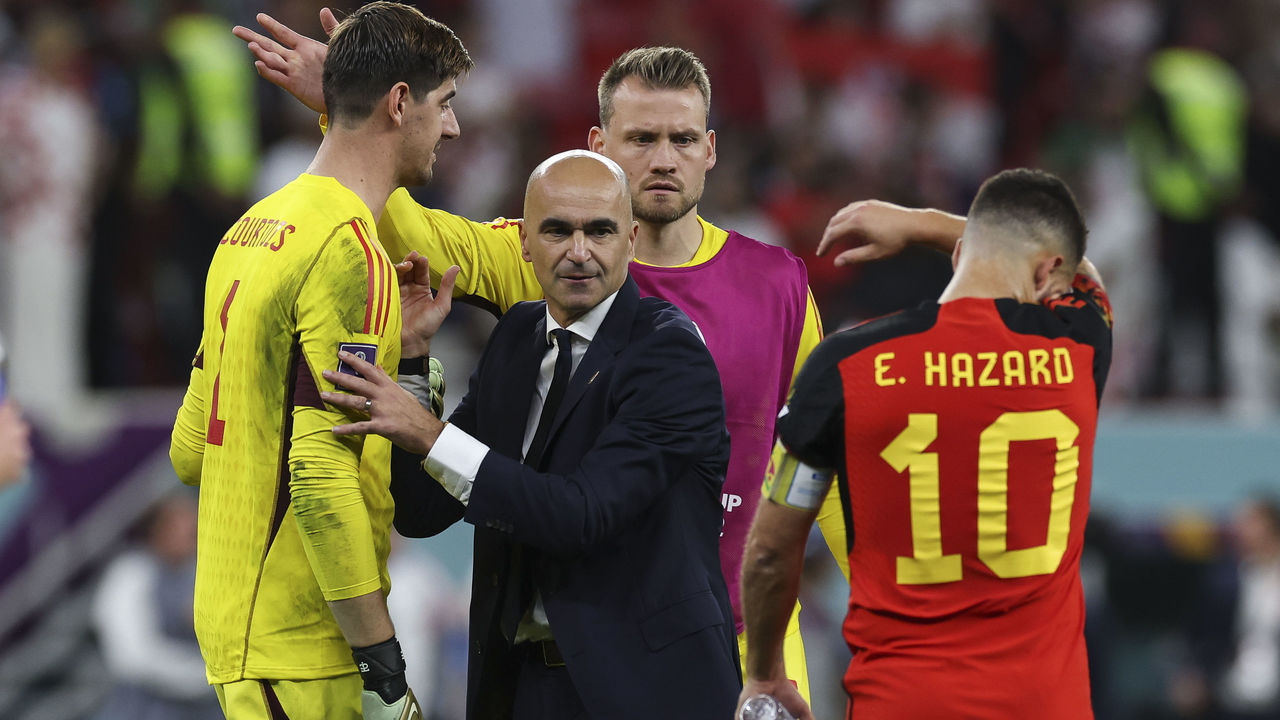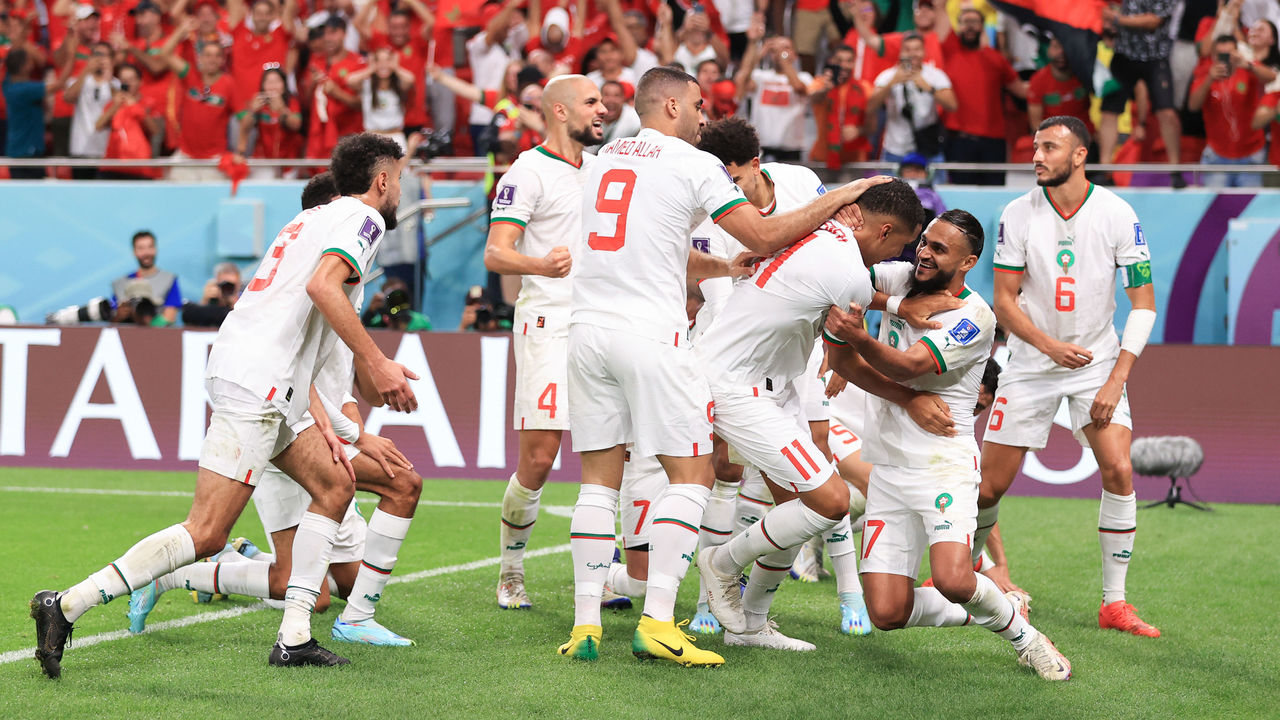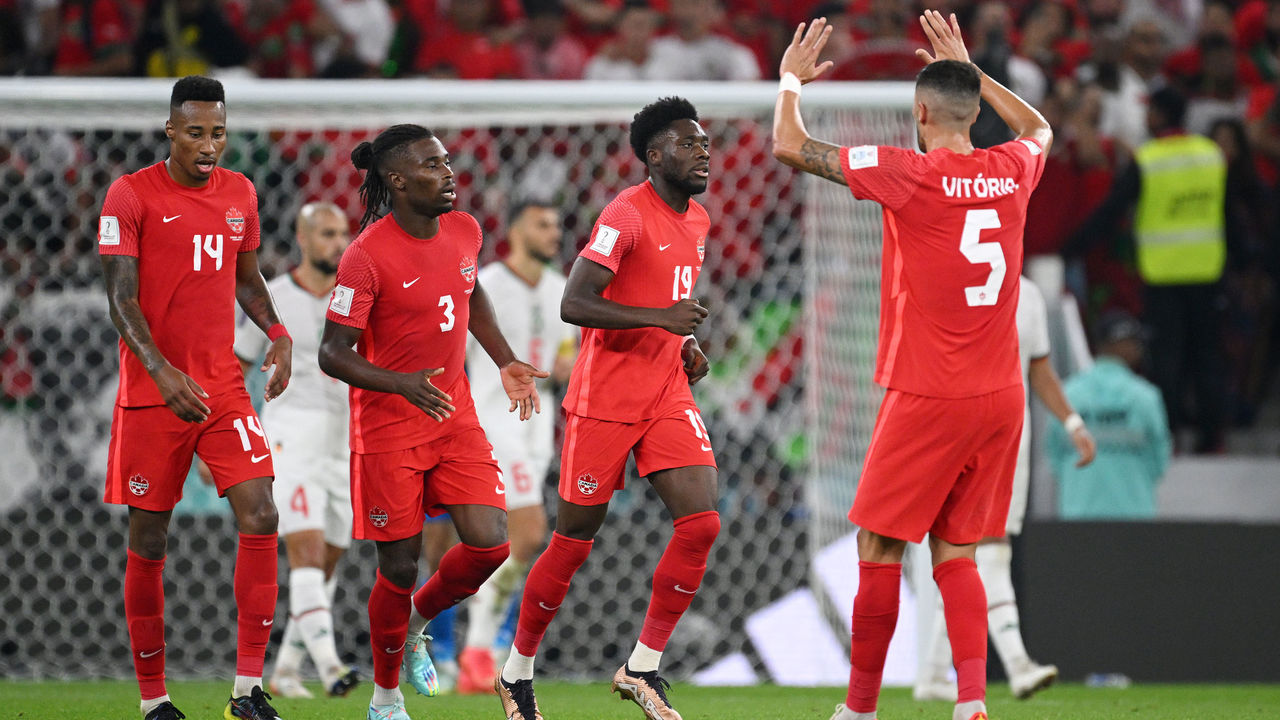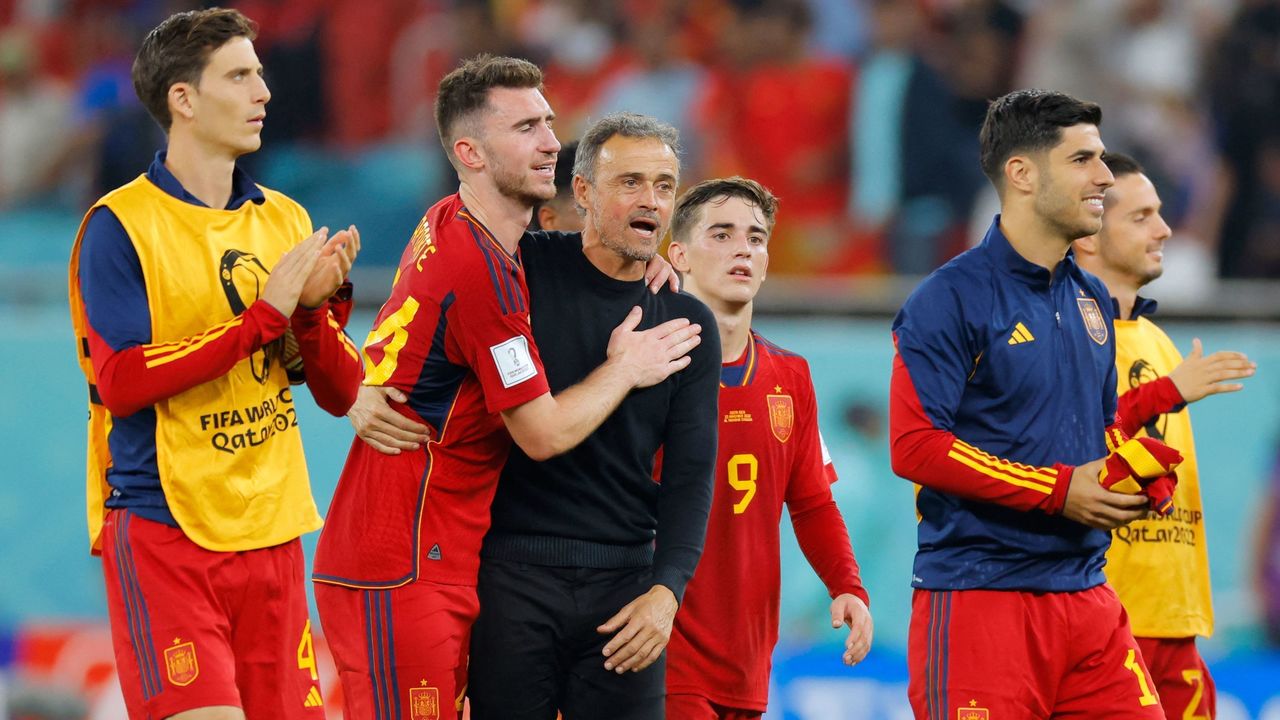World Cup roundup, Day 12: Belgium and Germany flop, Canada takes notes
The 2022 World Cup is in full swing. At the end of every matchday, we'll review the biggest talking points emanating from Qatar and break down all the action on the pitch. Below, we look back on Day 12 of the tournament.
Das Reboot 2.0?
There was once an aura of invincibility around the German national team. One way or another, Germany would always find a way to grind out results, particularly in a tournament setting. Mentally, it provided a huge edge and was an obstacle every other team had to contend with.
That has evaporated.
Despite a topsy-turvy 4-2 win over Costa Rica on Thursday, the Germans bowed out in the group stage for a second successive World Cup. Prior to the unlikely failure four years ago, Germany had made it beyond the first round at every World Cup dating back to 1954. Combined with a last-16 ouster at the recent European Championship, the former juggernaut is in disarray.
Veteran Thomas Muller dubbed the situation an "absolute catastrophe."
Germany, the team with the highest xG (+10.0) and xGD (+6.4) at the 2022 FIFA World Cup, is going home 🤯
— ESPN FC (@ESPNFC) December 1, 2022
UNBELIEVABLE! pic.twitter.com/x0uUF9sQ7r
"We have players who play with top clubs, and we do have the quality, (but) I believe that for the future of German football, we need to do things differently in training," manager Hansi Flick said after the dispiriting exit. "It will be very important to focus on the new generation of footballers. There are good players for the future, but for the next ten years, it is very important that we make the right steps now."
A total revamp from the ground up helped German football recover from the gloominess of the late '90s. That revival culminated with a World Cup title in 2014. A similar reboot probably isn't necessary this time around. There's always an appetite for sweeping change in the wake of significant setbacks, but this doesn't feel like the same situation. As Flick said, there's young talent emerging, headlined by Jamal Musiala, who shone brightly in Qatar despite his team's failure. Blowing everything up and starting from scratch isn't the path forward for Germany.
Belgium's golden generation flames out
For years, Belgium was the envy of almost every country. By the 2014 World Cup in Brazil, the Red Devils were routinely being tipped to compete for continental and global trophies thanks to a talent pool so deep that it seemed like a decade of glory was inevitable.
Instead, Belgium's trophy cabinet remains bare after one of the poorest showings at a World Cup in the European nation's history.
Thierry Henry consoled Romelu Lukaku after Belgium were knocked out of the World Cup 💔 pic.twitter.com/DMbxrgGynu
— ESPN UK (@ESPNUK) December 1, 2022
The widespread optimism born from the development of stars such as Kevin De Bruyne, Eden Hazard, Thibaut Courtois, and Romelu Lukaku has been slowly fading for years. All three blossomed into world-class players and won countless trophies at the club level.
But it's been a completely different story on the international stage for the quartet and Belgium. And now that story is on the brink of ending on a sour note without any silverware.
With De Bruyne, Hazard, Courtois, and Lukaku on the back end of their respective careers and without comparable talents coming from the youth system, the hype around Belgium may never be as high again.
Martinez's departure was inevitable, too late
Officially, it wasn't Belgium's colossal failure at the 2022 World Cup that cost Roberto Martinez his job. It seemed Martinez initially had stepped down on his own accord in the aftermath of Belgium's miserable World Cup campaign. But it appears there was an unofficial understanding between the Spanish coach and the Royal Belgian Football Association that it was time to go their separate ways.
With Martinez's contract set to expire after the tournament, hoisting the World Cup in Qatar was likely the only way he was coming back. After more than six years at the helm, it became crystal clear that the Red Devils desperately needed a new voice in the locker room.

But a change in leadership may have come too late with the country's best years - and chances of winning a major trophy - in the rearview mirror before the 2022 World Cup even kicked off.
Despite Belgium reaching the quarterfinals in four previous major tournaments and entering the 2022 World Cup as FIFA's second-ranked nation, doubts over Martinez's ability to lead this crop of superstars steadily grew. So did the cloud of pessimism hovering over the Belgian camp.
Belgium's hopes of challenging for the sport's most coveted trophy were wiped out almost immediately. And the team's dreadful performance in Qatar validated De Bruyne's ominous prediction that the Red Devils were "too old" to win the tournament.
Morocco fooled us all
The headlines about Morocco didn't inspire much confidence in its ability to compete at the World Cup.
It lost to Egypt in the quarterfinals of the 2021 Africa Cup of Nations before suffering a chastening 3-0 defeat to the United States in a summer friendly. Three months before the tournament started, the country's football federation fired Vahid Halilhodzic, the coach who helped the national team qualify for the World Cup, because of personal disagreements. Leading striker Youssef En-Nesyri, who plays for Sevilla, hadn't scored in 12 La Liga appearances, and a pre-tournament injury to Amine Harit robbed Morocco of one of its most creative midfielders.

But Halilhodzic's successor, Walid Regragui, moved quickly to unify the group. He immediately recalled Chelsea's Hakim Ziyech, one of the players the previous coaching regime had forced into exile, and put a greater emphasis on playing solid, defensive football.
The world should've taken more notice.
Morocco's shutout streak lasted 662 minutes. And although Regragui's team conceded in Thursday's 2-1 win over Canada, it largely frustrated the Canadians, denying them a first point at the World Cup. Morocco showed similar resolve in a goalless draw against Croatia and held off Belgium long enough to run off with a 2-0 win.
Morocco played smart, assured football at the right time. It put all the negative headlines aside and earned first place in Group F as its reward. Though the North Africans now face Spain in the knockout round, they've shown they can handle opponents of any size. Count them out at your own peril.
Important lessons learned for Canada
On paper, Canada's World Cup was an objective failure. Three matches played, three defeats, no points, and a goal difference of minus-five; Canada will finish the tournament 31st out of 32 teams. Officially, only host nation Qatar, with its three losses and minus-six differential, was worse. Harsh, considering some of the exciting moments John Herdman's team delivered in the desert. The Canadians pushed Belgium to the brink - even if that's not quite the accomplishment it appeared to be about a week ago - and had Croatia briefly on the ropes for 15 magical minutes. They also left with their heads high after an admirable finish in the defeat to Morocco.
There's plenty of room for optimism, and it's important to acknowledge and celebrate this team's accomplishments right now. Competing at the highest level and making the world take notice after the men's program was an afterthought for nearly four decades is no small feat.

"We belong on this world stage," defender Alistair Johnston said after Thursday's 2-1 loss to Morocco. He's right.
But now it's time to take the lessons learned in Qatar and apply them going forward. There's still a gap in quality that needs to be closed before Canada assumes co-hosting duties for the 2026 World Cup. The final result was disappointing, especially after the memorable qualifying run created genuine expectations throughout the country. But, in hindsight, perhaps the outcome wasn't entirely surprising. This isn't CONCACAF anymore. This is another tier. Canada isn't quite there just yet.
Herdman and his team need to ensure the harsh lessons learned in Qatar aren't in vain as it aims to reach that next level.
Quick free-kicks
Moriyasu the master
Japan had never beaten a former champion at the World Cup coming into this year's tournament. In the blink of an eye, the Samurai Blue have now done it twice in 10 days. Manager Hajime Moriyasu was the architect of two incredible - and incredibly similar - victories, making in-game tweaks and personnel changes that helped overturn 1-0 deficits against Germany and Spain, two of the most vaunted sides in world football. Moriyasu's halftime formation change against Germany altered the course of that contest, and his substitutes were decisive. His changes at the interval had the same impact Thursday, as Ritsu Doan and Kaoru Mitoma came off the bench against Spain. The former grabbed the equalizer shortly after the restart, and an incredible effort just minutes later from the latter created the match-winning goal. Should the surprise Group E winner need a spark at some point in its last-16 match against Croatia, Moriyasu's magic touch could turn the tide again.
What to make of Spain?

At any moment, Spain can look either like the most fluid, enchanting team on the planet or a defensively frail unit that's only capable of passing the ball sideways and becoming bogged down. No other team at the World Cup is so duplicitous. Thursday was a prime example. At times, Spain zipped the ball around the pitch and didn't let Japan have even a whiff of possession. Rodri, for instance, became the only player to attempt (and complete) over 200 passes in a World Cup match since that data started being collected in 1966. But for all the apparent control, La Roja crumbled in a hectic three-minute spell just after halftime and ultimately couldn't recover. Spain has looked spellbinding at times in this tournament and inept at others. And sometimes both within the same game. Trying to predict what Luis Enrique's team will do in the knockout stage is a fool's errand. Spain could easily make the final. It could also - just as easily - fall to Morocco in the next round.
Changes coming to 2026 World Cup format?
The benefits of overhauling the current format for the 2026 World Cup are reportedly being discussed behind the scenes in Qatar. With the expansion from 32 to 48 contestants, the current plan for the North American World Cup is to have 16 groups of three teams. But organizers have apparently engaged in "corridor chats" in Doha to get FIFA officials to consider the benefits of going with 12 groups of four teams instead of the format agreed upon in early 2017. The shakeup would result in a 104-game World Cup - 40 more than in Qatar - if group winners, second-place teams, and the eight best third-place teams progress. Such a proposal would likely interest FIFA and sponsors given the increased revenue. But fears over player safety throughout a jam-packed schedule could present an obstacle if FIFA adopts the change. Stay tuned, as stakeholders could formally discuss the change in the coming months.
Stat of the day
Possession? Pfft. Who needs it?
With 17.7% of the ball, Japan have won a World Cup game with the lowest possession figure in recorded WC history.#FIFAWorldCup pic.twitter.com/WTu4v4bTTd
— Opta Analyst (@OptaAnalyst) December 1, 2022
Tweet of the day
The streets will never forget.
Those four minutes when Costa Rica and Japan were going through and Spain and Germany weren’t were up there with the happiest times I’ve known
— Si Lloyd (@SmnLlyd5) December 1, 2022